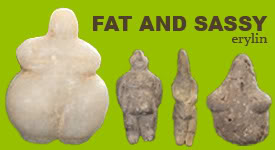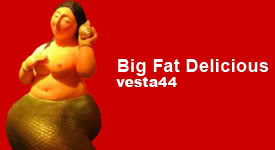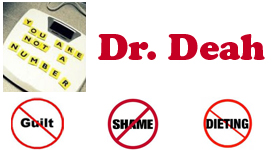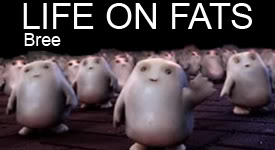A simple answer to a complex question.
I get irritated when I hear people throwing around the phrase “weight is as simple as calories in/calories out,” but not because I think the idea is patently wrong. Instead, because there is a great deal of blame underlying those words.
The blame comes from the assumption that the reason someone is fat is because of a lack of willpower. The belief that if we all eat less, we’d all be thinner (if only life were that simple).
My research into weight regulation has lead me to believe a few things:
- There are multiple reasons why a person might be a different weight than someone else.
- Science does not yet have a definitive test to tell an individual why we weigh more or less than another person.
I’ve previously written about the weight distribution curve, which suggests humans naturally come in a variety of weights. Genetically, humans are similar, but we’re definitely not identical.
Sure, if you are genetically predisposed to be at a higher weight and you overeat, then you can make yourself fatter. But I also think some people can’t get fat, no matter how much they try. And some people are fat no matter how little they eat (unless they starve themselves, but I don’t consider risking death healthy.)
Am I saying two people can eat the same amount but weigh different? Yes… but research shows it’s not common. There was this study done on ob/ob mice (the mice with genetic predisposition to obesity) where some rats became fat on normal food intake while other rats only became fat after overeating (4 out of the 33 rats in the study became fat without overeating.)
The problem with the calorie in/calorie out postulate is that it’s a simplification of a complex system. If people are going to use the law of thermodynamics when talking about weight, they need to remember that humans are not closed systems. We crave, chew, digest, and excrete (e.g., shit).
The idea that weight differences are based on metabolism has been generally dismissed by the medical community. They say slow metabolism exists, it’s just “rare.” So science is now looking in other directions.
Leptin resistance is one of the newer places of research into weight regulation. It brings up the question of how humans differ in the hormones that regulate appetite and satiety.
There’s also recent research into intestinal microorganisms. How food is processed within a person based on their gut flora could be another piece of the puzzle when it comes to weight regulation.
And I just stumbled upon something called the “Selfish Brain” theory. When people lose weight, their brain doesn’t lose mass because the brain is “selfish” about energy distribution. So, another possible explanation for some people being at a larger weight are disorders that comes from the energy “control centers of the brain.”
Anyone who has looked into the question of weight regulation will have to accept that weight is a multifactor trait. There’s quite a list of possible explanations as to why some people weigh more than other people. Science doesn’t yet have a complete model or simple explanation.
Maybe you can say “it’s as simple as calories in/calories out” because if our bodies have more calories that it need for our daily energy expenditure, then it turns those calories into fat. But HOW and WHY the body ends up with more energy isn’t as simple as just “willpower.”
And, really, my problem with the phrase is about a group of people being judged. Blame is such an ugly thing and weight is so… superficial. I wish more people would try on a little compassion, instead of jumping to a preconceived conclusion.























Wow, what a lot of great information, Elizebeth! I’m surprised about the ob/ob mice, though. I was under the impression that the same diet/different weight thing was well-established. Was that 4 out of 33 ob/ob mice? If so, that’s not significant at all.
But leptin is such an intriguing area of study. I can’t wait to see what else comes out of this area!
Peace,
Shannon
Ghrelin is another hormone that is believed to be responsible for hunger cues. I believe that too much ghrelin can cause a person to continue to feel hungry even after they have just eaten. This at least is the postulation behind performing a sleeve gastrectomy, that the part of the stomach which produces ghrelin is removed. I am not advocating this, only stating what I’ve read. I’m not the statistics master that some of you good folks are!
That being said, I agree with everything you said particularly the part about blame and shame. As it’s been said before, if shame worked for weight loss, everyone would be thin! Obviously shame ain’t working and we should all stop it.
If they say “weight is as simple as calories in/calories out” I say, “Sure, if your body is no more complex than a paper bag.”
Considering how many factors go into determining our setpoint weight, I would have thought it’s very common that two people can eat the same amount and have different weights, just as two people’s intakes can vary, yet they’d adhere to the same weight. Since weight and amount consumed are both continua, how near to each other do the numbers have to be in order to be considered the same?
How do you define overeating for a rat? Is it X% more chow per day? Can they measure the level of hunger of a rat that was forced not to overeat?
If we had the bodies we “deserved” based on what we’d eat, I’d look like my skinny co-workers and they’d look like me. Since that’s not the case, they just exclude me from the clan Fatty McFatterson. Some day they might look around and realize very few of us have the bodies we deserve from our eating habits. But I’m not holding my breath.
I have five cats. They all eat the same food. Two of them are around the weight that cats are “supposed” to be. Two of them are hefty males, and one is a very big plump calico female. The calico doesn’t eat any more than the other cats, in fact she probably eats less than the biggest male. My little guy is just genetically small-he doesn’t eat less than the others, but he’s slim. None of them allow themselves to be bullied into no food. So, why Miss Bumble Bee (which is what she looks like) is so much fatter than the others and little guy is so much slimmer can’t be explained by simple calories in.